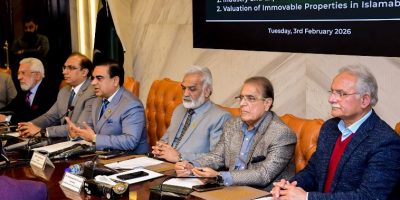Anjum Nisar says without addressing fundamental dysfunctions country will falter

ISLAMABAD, NOV 3: /DNA/ – The Federation of Pakistan Chambers of Commerce and Industry (FPCCI) Businessmen Panel (BMP) on Sunday placed significant responsibility on the government to pursue reforms for long-term stability, as with continuous hike in cost of production in the country, what the Pakistan’s economy really needs is persistent and sound economic management.
The FPCCI former president and BMP Chairman Mian Anjum Nisar said asked the authorities for undertaking economic reforms and improving the regulatory environment for better Ease of Doing Business level to boost foreign investment so that financial stability can be achieved in the long-run, warning the government that extensive borrowing is unlikely to put the country’s economy back on track.
He said that Pakistan’s industry had been harmed by the high cost of doing business, which discouraged investment in capacity and capability and called for easing the burden of heavy taxes on the power sector.
Mian Anjum Nisar stated that the constant increase in power tariffs on the pretext of fuel adjustment had increased electricity prices and added to the already high cost of trade and industry. Seeking comparable energy tariffs for domestic industries in order to capture the global market, he stated that due to high electricity rates, power theft became rampant as the tariff was unaffordable to consumers.
Pakistan had reached agreement with the IMF for the 37-month loan, the 25th since 1958. The government has hailed the decision, insisting that the government was committed to implementing reforms demanded by the deal. He said he also hoped that this would be Pakistan’s last IMF program. Economic analysts said that while Pakistan has stabilised after a prolonged period of volatility, much work needs to be done. The agreement, in the short term, will create space for the government, but if the medium-term outlook is to improve, then the government needs to pursue structural reforms that create both fiscal space for Islamabad and assuage concerns about debt sustainability, they said.
Pakistan’s debt, which poses the biggest strain on its $350 billion economy, requires $90 billion in repayments over the next three years, with the next major tranche due in December. Foreign reserves with the central bank currently stand at $16 billion, sufficient to cover just over three months of imports. The senior economists said that the loan primarily aims to ease Pakistan’s debt repayments. While much needed, a program built around rollovers, expensive borrowing from commercial banks to fill in financing gaps is hardly to bring any sustainable solutions to Pakistan’s economic and financial challenges, they added.
Pakistan is the IMF’s fifth-largest debtor, owing more than $7 billion as of September 25, according to the lender’s data, after Argentina, Egypt, Ukraine and Ecuador. Analysts say one challenge before Pakistan will be to build a broad political consensus around the reforms needed under the IMF deal, including taxes, raising energy tariffs and allowing market forces to determine the Pakistani rupee’s value. Political stability will define the fate of the program and the economy. Implementation of the reforms agenda outlined in this program, such as no subsidies from provinces, taxes on the agriculture sector, privatization a very high level of commitment from different political parties ruling in respective provinces, they said.
Without addressing fundamental dysfunctions, the country will almost certainly falter. Long-term possibilities are immense, but they remain untapped, they said, referring to the political schisms in the country and the risks they pose to a unified approach towards reforms.
He urged the power ministry to identify system constraints and communicate targets to all concerned departments in order to launch a wartime effort to upgrade the transmission system. He urged the completion of all ongoing power projects well ahead of schedule. He stated that business-friendly policies must be adopted, similar to those adopted by other neighboring countries in the region. He suggested that the amount specified in trade policy be used to promote exports by providing incentives to trade and industry and by exploring new markets. According to him, Pakistan’s electricity prices were already on the high side, which was the primary reason for the country’s price hikes. He stated that providing affordable electricity would assist in lowering production costs, thereby benefiting the public. He stated that rising imports and a widening trade deficit posed a serious threat to economic growth and must be addressed urgently.
He accused all previous governments for extensive borrowing of forex during last five years to meet local expenditure, which had increased the burden of foreign debt of Pakistan substantially, instead of making serious efforts to enhance the ranking of Ease of Doing Business Index of Pakistan, as it is must to attract foreign as well as local investment and high economic growth.
The BMP chief stressed the need for reducing cost of doing business, besides evolving a new price control mechanism, as huge taxation, rising oil prices and constant jump in electricity and gas tariffs have lifted the inflation.
Related News

FPCCI opens Pakistan-EU business forum membership for 2026
KARACHI, FEB 4: /DNA/ – Atif Ikram Sheikh, President FPCCI, has announced that the Pakistan-EURead More

PM’s relief package to strengthen export base: ICCI President
Applauds FBR for rationalizing Islamabad Property Valuation ISLAMABAD, FEB 3 /DNA/ – The Islamabad ChamberRead More


Comments are Closed